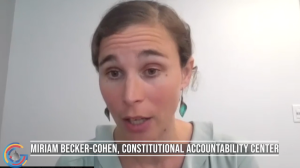October 2023 Newsletter: CAC Files Brief in Trump Ballot Challenge Case in Minnesota Supreme Court

October 6, CAC filed an amicus brief in Growe v. Simon, a Minnesota Supreme Court case that will determine whether Donald Trump can be prohibited from appearing on the Minnesota ballot due to his disqualification for office under Section Three of the Fourteenth Amendment. Section Three disqualifies anyone “having previously taken an oath . . . to support the Constitution of the United States” who then “engaged in insurrection or rebellion against the same, or g[ave] aid or comfort to enemies thereof” from holding state or federal office. The Minnesota Supreme Court asked the parties to brief whether Section Three applies to presidents who engage in insurrection and whether it can disqualify people from becoming president, and, as our amicus brief explains, the answer to both questions is a resounding “yes.”
Section Three was added to the Constitution shortly after the Civil War with Confederate turncoats top of mind, but with a broader goal of preventing any future officers of the United States who would engage in insurrection against the country from holding office. CAC drew on extensive historical research, delving into sources such as Reconstruction Era dictionaries, legislative debates around the Fourteenth Amendment, and decades of legal opinions to demonstrate that Section Three clearly applies to both presidents and the presidency. As one archival newspaper article warned, Section Three was necessary to prevent Jefferson Davis from running for President of the United States.
This interpretation of Section Three is also sheer common sense. The Framers of the Fourteenth Amendment sought to prohibit officeholders who betrayed their country from holding political power again, and repeatedly emphasized that Section Three applied to anyone who violated the oath they took to support the Constitution. It strains credulity to claim that the Framers of Section Three, who sought to disqualify insurrectionist officers as wide-ranging as postmasters, corporals, and potential governors, would have permitted an insurrectionist president. As CAC’s Vice President Praveen Fernandes explained to Law and Crime, “Considering the debates and the primary animating purpose behind Section III, it is unfathomable to think these lawmakers would be worried only about lower offices, but not the highest and most powerful office in the land.”
After the January 6th insurrection, CAC has fought to ensure that constitutional provisions protecting our democracy do not go unenforced against insurrectionists. While the animating concern of Section Three was the former Confederacy, its Framers discussed their fears of another unforeseen rebellion against the United States, and so they deliberately chose to use language broad enough to encompass future insurrections. In 2022, CAC filed in a Fourth Circuit case involving January 6th participant Madison Cawthorn. The Fourth Circuit ultimately issued an important ruling making clear that Section Three applies to January 6 insurrectionists, not just former Confederates. We also filed in Section Three litigation in the Eleventh Circuit involving Marjorie Taylor Green. CAC’s Chief Counsel Brianne Gorod told the Los Angeles Times that failing to enforce Section Three as broadly as its text and history require “could effectively turn this critically important provision of our Constitution into a dead letter.”
In the aftermath of an unprecedented attack on American democracy, courts must enforce the text of the Constitution to protect the democratic process and our system of government. The Constitutional Accountability Center will continue to encourage them to do so, building on our previous Section Three litigation. We’re staying true to our name: everyone, including former presidents, must be held accountable to our Constitution.

- Growe v. Simon — The Minnesota Supreme Court is considering whether Donald Trump should be allowed to appear as a candidate on the Minnesota ballot due to his disqualification from office under Section Three of the Fourteenth Amendment. CAC’s brief explains that the text and history of Section Three demonstrate that Section Three operates to preclude a person from being President of the United States” and “applies to a person who has previously taken an oath as President of the United States.” Minnesota Supreme Court, filed October 6.
- Department of Agriculture Rural Development Rural Housing Service v. Kirtz — The Supreme Court is considering whether private individuals can sue the federal government for violating the Fair Credit Reporting Act where Congress has waived sovereign immunity. CAC’s brief in support of Kirtz explains that the FCRA plainly waives the USDA’s sovereign immunity and that the Court should respect the FCRA’s text. Supreme Court, filed October 2.
- Loper Bright Enterprises v. Raimondo — The Supreme Court is considering whether to alter or overrule the Chevron doctrine, a legal framework that permits judges to defer to agencies’ reasonable interpretations of ambiguous laws. CAC’s brief on behalf of scholars of administrative law and the Administrative Procedure Act explains that deference to agencies on questions of law is entirely consistent with the text and history of the APA. Supreme Court, filed September 22.


- October 3: CAC Appellate Counsel Miriam Becker-Cohen appeared on Gray Television discussing the Supreme Court case Acheson Hotels, LLC v. Laufer and the influence of tester lawsuits. “CAC’s Becker-Cohen discusses Supreme Court ADA violations case.”
- October 13: CAC Human Rights, Civil Rights, and Citizenship Program Director David Gans was quoted in an article in Reuters discussing the details of the Supreme Court voting rights case Alexander v. The SC Conf. of the NAACP and what a conservative victory would mean. “US Supreme Court may make it harder to prove racial gerrymandering.”
- October 10: CAC’s brief in Alexander v. SC Conf. of NAACP was quoted in a Roll Call article that discussed the case’s upcoming oral arguments in the Supreme Court. “Supreme Court to hear arguments on use of race in South Carolina congressional map.”
- October 7: CAC Chief Counsel Brianne Gorod sat for an interview with Capitol Account where she discussed CAC’s mission, the Consumer Financial Protection Bureau, and the broader challenges to the administrative state before a conservative Court. “Talking Conservative Courts and the Constitution; McHenry for Speaker?; SEC’s Enforcement Overdrive.”
- October 6: CAC Chief Counsel Brianne Gorod’s response to an op-ed claiming that the CFPB is unconstitutional was published in the Washington Post. “Opinion | The Consumer Financial Protection Bureau’s funding is constitutional.”
- October 5: CAC Chief Counsel Brianne Gorod joined the National Constitution Center as a speaker on an episode of their podcast We The People discussing the Supreme Court case CFPB v. CFSA. “Is the Consumer Financial Protection Bureau Unconstitutional?”
- October 4: CAC was mentioned in an article in Democracy Docket as one of seven groups that submitted an amicus brief in support of the South Carolina State Conference of the NAACP in the Supreme Court Case Alexander v. South Carolina State Conference of the NAACP. The article quoted our brief and highlighted its main arguments. “Friend or Foe: Amicus Briefs in SCOTUS Case Over South Carolina Congressional Map.”
- October 3: CAC Chief Counsel Brianne Gorod was quoted in an article in The Hill giving her response to the oral argument in CFPB v. CFSA. “Supreme Court’s new term to take on federal agency powers in earnest.”
- October 2: CAC Chief Counsel Brianne Gorod was quoted in an article Bloomberg Law discussing the potential consequences of a decision declaring the CFPB’s funding unconstitutional. “CFPB’s Future at Stake as Supreme Court Hears Funding Arguments.”
- October 2: CAC was mentioned in an episode of the Strict Scrutiny podcast as one of the organizations that filed a brief in CFPB v. CFSA. “What Fresh Hell Will This Supreme Court Term Bring?”
- October 2: CAC was mentioned by Public Citizen as one of over 30 organizations that signed an open letter calling for the protection of jurors in former President Trump’s criminal trials. “Over 30 Organizations Sound Alarm to Protect Juries in Trump Trials.”
- October 2: CAC Chief Counsel Brianne Gorod, Senior Appellate Counsel Brian Frazelle, and former Kendall Fellow Alex Rowell’s blog on the Fifth Circuit’s Decision in CFSA v. CFPB was quoted in an article in Common Dreams discussing the importance of CFPB v. CFSA in the Supreme Court. “Existential Threat to CFPB Spotlights Massive Stakes of New Supreme Court Term.”
- October 1: CAC Chief Counsel Brianne Gorod was quoted in an article in Fox News discussing what’s to come as the newest Supreme Court term starts. “Supreme Court prepares for new term by looking back, with likely impact on 2024 elections.”
- October 1: CAC Chief Counsel Brianne Gorod was quoted in an article in NBC News discussing the current conservative attacks on the administrative state. “Trump’s war on federal agencies—fueled by his judges—reaches the Supreme Court.”
- September 29: CAC Vice President Praveen Fernandes was quoted in an article in Law&Crime discussing Section Three of the Fourteenth Amendment and how it applies to the presidency. “Trump’s fight to stay on 2024 election ballot threatens to turn Constitution’s insurrection clause into ‘historical ornament,’ experts say.”
- September 25: CAC Chief Counsel Brianne Gorod was quoted in a release from American for Financial Reform discussing CAC’s brief on behalf of scholars of history and constitutional law in CFPB v. CFSA and what’s at stake in the case. “How a SCOTUS Ruling on CFPB the Term Court Destabilize Financial Markets.”

